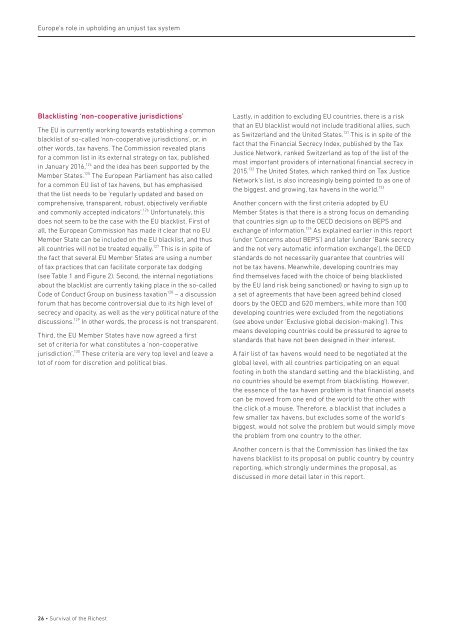You also want an ePaper? Increase the reach of your titles
YUMPU automatically turns print PDFs into web optimized ePapers that Google loves.
Europe's role in upholding an unjust tax system<br />
Blacklisting ‘non-cooperative jurisdictions’<br />
The EU is currently working towards establishing a common<br />
blacklist <strong>of</strong> so-called ‘non-cooperative jurisdictions’, or, in<br />
o<strong>the</strong>r words, tax havens. The Commission revealed plans<br />
for a common list in its external strategy on tax, published<br />
in January 2016, 124 and <strong>the</strong> idea has been supported by <strong>the</strong><br />
Member States. 125 The European Parliament has also called<br />
for a common EU list <strong>of</strong> tax havens, but has emphasised<br />
that <strong>the</strong> list needs to be ‘regularly updated and based on<br />
comprehensive, transparent, robust, objectively verifiable<br />
and commonly accepted indicators’. 126 Unfortunately, this<br />
does not seem to be <strong>the</strong> case with <strong>the</strong> EU blacklist. First <strong>of</strong><br />
all, <strong>the</strong> European Commission has made it clear that no EU<br />
Member State can be included on <strong>the</strong> EU blacklist, and thus<br />
all countries will not be treated equally. 127 This is in spite <strong>of</strong><br />
<strong>the</strong> fact that several EU Member States are using a number<br />
<strong>of</strong> tax practices that can facilitate corporate tax dodging<br />
(see Table 1 and Figure 2). Second, <strong>the</strong> internal negotiations<br />
about <strong>the</strong> blacklist are currently taking place in <strong>the</strong> so-called<br />
Code <strong>of</strong> Conduct Group on business taxation 128 – a discussion<br />
forum that has become controversial due to its high level <strong>of</strong><br />
secrecy and opacity, as well as <strong>the</strong> very political nature <strong>of</strong> <strong>the</strong><br />
discussions. 129 In o<strong>the</strong>r words, <strong>the</strong> process is not transparent.<br />
Third, <strong>the</strong> EU Member States have now agreed a first<br />
set <strong>of</strong> criteria for what constitutes a ‘non-cooperative<br />
jurisdiction’. 130 These criteria are very top level and leave a<br />
lot <strong>of</strong> room for discretion and political bias.<br />
Lastly, in addition to excluding EU countries, <strong>the</strong>re is a risk<br />
that an EU blacklist would not include traditional allies, such<br />
as Switzerland and <strong>the</strong> United States. 131 This is in spite <strong>of</strong> <strong>the</strong><br />
fact that <strong>the</strong> Financial Secrecy Index, published by <strong>the</strong> Tax<br />
Justice Network, ranked Switzerland as top <strong>of</strong> <strong>the</strong> list <strong>of</strong> <strong>the</strong><br />
most important providers <strong>of</strong> international financial secrecy in<br />
2015. 132 The United States, which ranked third on Tax Justice<br />
Network’s list, is also increasingly being pointed to as one <strong>of</strong><br />
<strong>the</strong> biggest, and growing, tax havens in <strong>the</strong> world. 133<br />
Ano<strong>the</strong>r concern with <strong>the</strong> first criteria adopted by EU<br />
Member States is that <strong>the</strong>re is a strong focus on demanding<br />
that countries sign up to <strong>the</strong> OECD decisions on BEPS and<br />
exchange <strong>of</strong> information. 134 As explained earlier in this report<br />
(under ‘Concerns about BEPS’) and later (under ‘Bank secrecy<br />
and <strong>the</strong> not very automatic information exchange’), <strong>the</strong> OECD<br />
standards do not necessarily guarantee that countries will<br />
not be tax havens. Meanwhile, developing countries may<br />
find <strong>the</strong>mselves faced with <strong>the</strong> choice <strong>of</strong> being blacklisted<br />
by <strong>the</strong> EU (and risk being sanctioned) or having to sign up to<br />
a set <strong>of</strong> agreements that have been agreed behind closed<br />
doors by <strong>the</strong> OECD and G20 members, while more than 100<br />
developing countries were excluded from <strong>the</strong> negotiations<br />
(see above under ‘Exclusive global decision-making’). This<br />
means developing countries could be pressured to agree to<br />
standards that have not been designed in <strong>the</strong>ir interest.<br />
A fair list <strong>of</strong> tax havens would need to be negotiated at <strong>the</strong><br />
global level, with all countries participating on an equal<br />
footing in both <strong>the</strong> standard setting and <strong>the</strong> blacklisting, and<br />
no countries should be exempt from blacklisting. However,<br />
<strong>the</strong> essence <strong>of</strong> <strong>the</strong> tax haven problem is that financial assets<br />
can be moved from one end <strong>of</strong> <strong>the</strong> world to <strong>the</strong> o<strong>the</strong>r with<br />
<strong>the</strong> click <strong>of</strong> a mouse. Therefore, a blacklist that includes a<br />
few smaller tax havens, but excludes some <strong>of</strong> <strong>the</strong> world’s<br />
biggest, would not solve <strong>the</strong> problem but would simply move<br />
<strong>the</strong> problem from one country to <strong>the</strong> o<strong>the</strong>r.<br />
Ano<strong>the</strong>r concern is that <strong>the</strong> Commission has linked <strong>the</strong> tax<br />
havens blacklist to its proposal on public country by country<br />
reporting, which strongly undermines <strong>the</strong> proposal, as<br />
discussed in more detail later in this report.<br />
26 • <strong>Survival</strong> <strong>of</strong> <strong>the</strong> <strong>Richest</strong>


